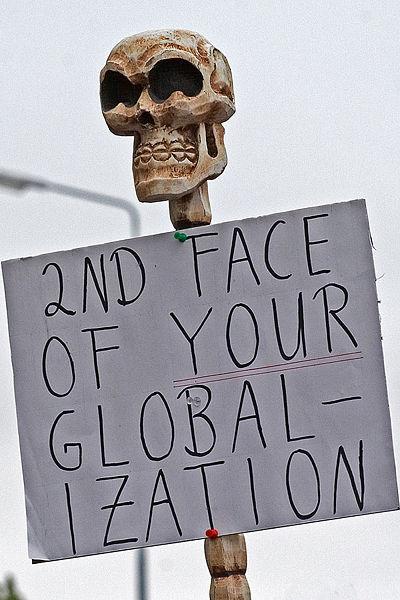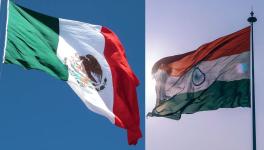The Ghost of the West, Under Globalisation
Much has been written about U.S. brinkmanship with default, but the clear lesson that can be drawn from this unprecedented situation is that a lunatic fringe can block democracy.
Representatives belonging to the Tea Party movement, who obliged the Republican Party to enter a war without fall-back positions, are not worried about their re-election. The redrafting of electoral districts is now heavily in favour of incumbents, and makes electoral colleges safe for the large majority of senators In the seven states where Republicans had complete control over the redrafting process, Republican Party candidates to the House of Representatives in the 2012 elections received 16.7 million votes while Democratic Party candidates received 16.4 million votes. The redistricting resulted in Republican victories in 73 out of the 107 seats concerned; in those states, Republicans received 50.4% of the votes, but won in over 68% of the districts. But the radical right wing enjoys a far superior electoral machine, financed by the two billionaire brothers Koch, who are intent to wipe out moderate Republicans. They do not care about political viability. They want to get rid of President Barak Obama and the state, and restore to the United States a world where the American dream will again be possible.

Image Courtesy: en.wikipedia.org
That American dream is gone, and the U.S. political fabric is in tatters. At every election, the number of white voters declines by 2%, making it probable that the President will be a Democrat and the Congress Republican, because of the district electoral system. The Founding Fathers of the United States established a system of balances among between the legislative, executive and judiciary arms of the state, but they could not foresee the birth of the Tea Party movement and Congress losing its function as an efficient balance to the executive. And they could not foresee that the judiciary (the Supreme Court) would become deeply politicised and give way to uncontrolled funding from corporations and billionaires, fundamentally altering democracy. To make it possible for different states to join the Union, the Founding Fathers introduced a number of features that today are quite odd. One is that each state has two senators irrespective of the number of inhabitants (thus two for Alaska’s 740,000 inhabitants and, likewise, two for California’s 38 million; the least populated states, therefore, have a majority over the most populated states. Then, if a senator dies, it is the state’s governor who nominates the replacement; so, if a Democrat dies and the governor is Republican, a Republican senator is nominated. And then the President is elected according to the electoral votes given to each state, and not by popular vote, meaning that he or she can obtain the majority of popular votes but lose to the candidate who obtains 270 electoral votes from the states.
Of course, the Republican Party has taken a good beating, and perhaps the Tea Party movement is a passing fad. But when you look at a very simple and proven fact, hopes are thin. This simple fact is that, contrary to a myth running in the Left, crisis tends to reinforce the Right. Hitler came to power because of the financial burden brought about by the Versailles agreement after World War I. Lenin came to power because of his ability to mobilise the masses, not because there was worsening of the economic situation in Russia.
The Tea Party movement, therefore, is a signal of the crisis of the United States, which is coming to realise that it no longer has an exceptional destiny, and that it is slipping from its position as the sole world power. Social inequality is growing fast (every day there are 3,000 new poor), unemployment has become chronic, and there is ample depiction of a “new economy” in which labour would become minimal and finance would provide the economic lift. Gone is the dream that, by working hard, you can become a millionaire. Insecurity and fear play a powerful role in the ascendancy of the Tea Party movement as a grass-roots, anti-establishment, anti-globalisation, anti-state and anti-immigrant movement. But this is not just a U.S. phenomenon, it is happening all over the West, where populism is on the rise.
In Europe, there was also a dream: a decent job, a stable life, access to education and health care, and political stability. Europe did not have guns and God like the American dream; it was more communitarian and less individualistic, but a dream nevertheless. That dream is now vanishing as austerity and dismantlement of welfare are becoming a vicious circle everywhere, with the partial exception of Germany. The young are the most visible victims of this “new economy” and the sense of insecurity and fear is feeding the counterparts of the Tea Party movement.
In Norway, which experienced the nightmare of the bombing and mass shooting perpetrated by right-wing terrorist Anders Behring Breivik in July 2011, leaving 77 dead, the Progress Party (of which Breivik was a member) is now firmly in the country’s government. In Poland, the euro-sceptic Law and Justice party is surging again, as is the Civic Democratic Party in the Czech Republic. Polls are showing the same for the Freedom Party of Geert Wilders in the Netherlands and the tide is also rising for Austria’s Freedom Party, the Movement for a Better Hungary, the True Finns, the Swedish Demokraten and the Belgian Vlaams Belang. In Italy, there are now two euro-sceptic parties or movements – the North League and the 5 Stars Movement. In Germany, the Alternative for Germany, which calls for the withdrawal from European institutions, failed to enter the Bundestag by a mere 0.1%.The case of Golden Dawn in Greece is well know By the way, it is worth noting that many of those parties did not exist or were marginal, before the crisis of 2008.
Every crisis needs its scapegoats; today, they are immigrants and, in particular, the Roma. All economists agree that Europe needs at least 20 new million people to remain competitive internationally. All U.N. and European Union studies converge on the fact that immigrants take jobs that locals do not want, that they stimulate demand and improve economic performance, and that only by having more people than provided for by a negative birth rate can the pension system of an ageing population remain viable. Further studies indicate that immigrants want to pay taxes and social contributions as soon as they can because it gives them the integration in a system for which they left their country of origin. There are now 45 million immigrants (13% of them students) in Europe (out of a population of 450 million), and the unemployed are less than 1%. They account for only 1% of public subsidies and just 0.2% of the costs of the health system.
Yet, no government is making any attempt to educate its citizen about this reality. On the contrary, there is a general tendency to restrict immigration. French Interior Minister Manuel Valls, a son of Catalan immigrants, is now the most popular politician in the Socialist government because of his stance on Rom; the snatching of a 15-year-old Rom girl from a school bus by French police earlier this month, then deported with her entire family, had 67% of popular support. There are 20,000 new Rom in France, out of a population of 66 million people (the United States has one million Rom and Brazil 800,000). Of Europe’s total Rom population of 12 million, two million live in Rumania and 800,000 in Bulgaria. Ever since the Middle Ages, Rom have been subject to persecution (the Nazis killed at least 500,000 as an “inferior race”), and there is debate about whether their lack of integration has cultural causes, as their enemies say, or economic reasons, such as lack of jobs and schooling.
The simple fact is that, as a recent Financial Times survey showed, Europeans have lost their solidarity. A total of 71% of those interviewed wanted their government to eliminate social benefits given to other European Union citizens living in their country. If they had been questioned about those from outside the European Union, who knows how much higher that percentage would have been? At the same time, 52% said that the European Union should have less power than now. Asked if they would vote for an anti-European party, 19% answered yes. This means that, with a probable low turnout, the result of next year’s European elections will be a dysfunctional European parliament – and this will provide the ground for common space among all the populist parties.
Will the traditional parties be able to stop this phenomenon? No, no more than the Republicans in the United States have been able to ignore the Tea Party movement. On the contrary, the trend is to erode the platform of those parties. Manuel Valls in France is the best example of this strategy. The problem is that the 13 progressive parties in power (out of the 28 countries of the European Union) are all following more or less the same strategy and, of course, people will prefer to vote for the original rather than the copy, as the polls indicates. Centre-left parties are in serious crisis, doing what the right was exclusively supposed to do, like cutting welfare, reducing the social safety system, dismantling hospitals and affordable education, and applying austerity measures. The lack of economic growth eliminates redistribution and neoliberal globalisation continues to exert downward pressure on wages and working conditions, while the demographics of ageing societies with a shrinking young workforce make welfare benefits and pensions harder to sustain.
In all this, the statistics on growing social inequality are staggering. According to the London School of Economics, we will have returned to the times of Queen Victoria within 20 years, wiping out nearly two centuries of social progress. Populism was the ground from which Hitler came, and social injustice the ground from which Lenin came. History does not repeat itself, but it will be interesting to see how a new solution will turn out for well-known old problems … hopefully without the blood and tears that humankind has shed since Queen Victoria’s days.
Disclaimer: The views expressed here are the author's personal views, and do not necessarily represent the views of Newsclick
Get the latest reports & analysis with people's perspective on Protests, movements & deep analytical videos, discussions of the current affairs in your Telegram app. Subscribe to NewsClick's Telegram channel & get Real-Time updates on stories, as they get published on our website.
























